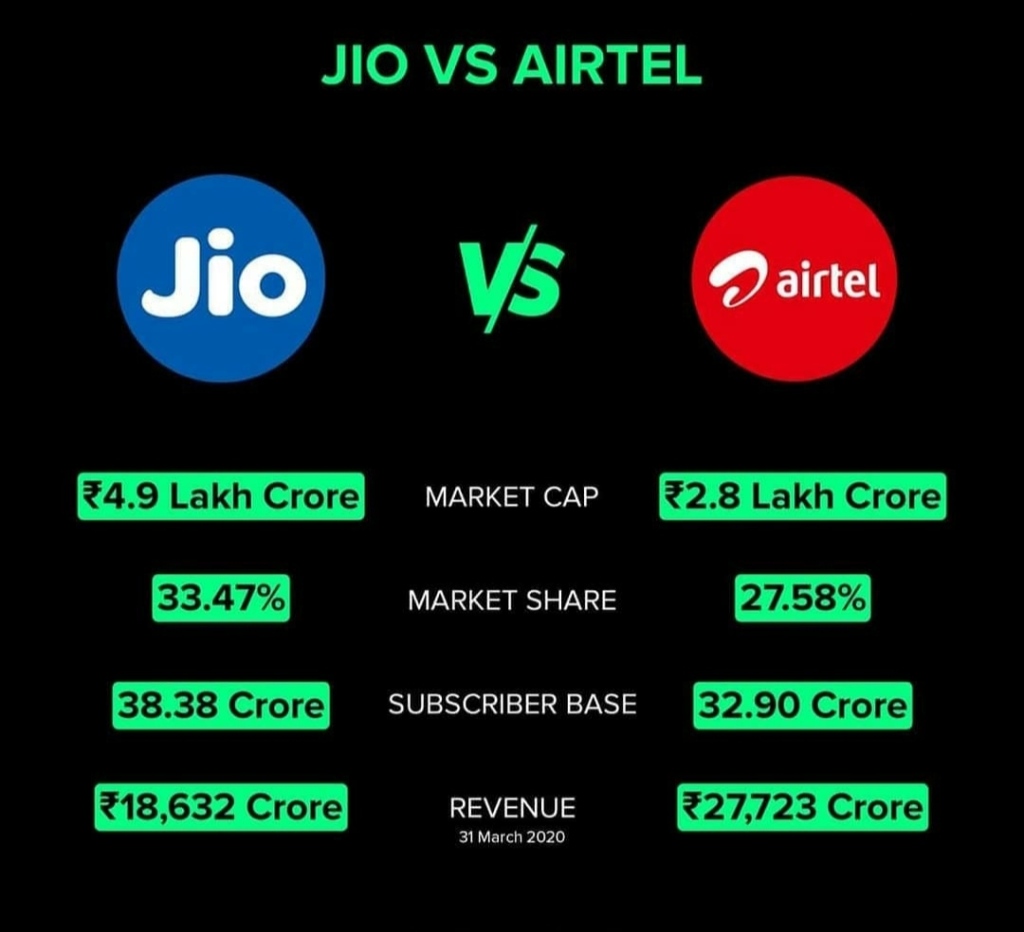img. source google
Several years ago, India had one of the world’s most competitive telecom markets, with numerous players vying for business. Now, there is a serious risk of monopoly. when reliance jio enter in the telecom business in 2016 , with in short period of time jio about to create monopoly in INDIAN telecom industery , with the more than 398.3 million subscribers , as of june 30th 2020 , it was reported that jio is the fastest growing telecom company .
The Indian conglomerate Reliance Industries is using its newly minted telecom monopoly to expand into other sectors of the Indian economy in partnership with multinational companies including Google, Facebook and Microsoft. Its 5G claims are a signal that it is now a part of the US-led global alliance against China’s tech companies.
The combined market cap of the Reliance oil and telecom empire is US$189 billion, making it the only Indian company in the top 50 global list and 10th in Asia. In four years, Reliance Jio used its parent’s oil and gas revenues to power its way into telecom and become the leading Indian player. It bled the others with its initial low, predatory pricing rates, until they surrendered, accepting Jio as the undisputed market leader.
Since Jio’s arrival, India’s competition authorities have waved through a succession of takeovers and mergers that would have set off alarms in just about any other democratic country. Consolidation usually means the disappearance of perhaps two or three players. India’s list of casualties is long enough to pin to an industry memorial. They include names such as Aircel, MTS, Reliance Communications, Telenor . Vodafone India and Idea Cellular, two former titans, have merged.
No doubt, India was ripe for change. When Jio rocked up, it looked grossly inefficient and had fallen behind other parts of the world on the rollout of high-speed mobile data networks. The catalyst provided by a new operator, taking advantage of the latest technologies, was welcome.
jio Investors

image source jio website ,
in this image it is clearley shown all the investor of the jio and ammount of stake in jio .
In the latest development, India has been forced to postpone a 5G spectrum auction that was supposed to happen this April. Neither Bharti Airtel nor Vodafone Idea is in a position to buy new spectrum licenses at the high prices the government wants to charge. Only Jio could realistically afford those rates. only because of using the money of Rel. oil and a huge amount of FDI , in last 3 month jio raised 115693.95 crore from leading global investors including Facebook, Silver Lake , General Atlantic, KKR , mubadala, ADIA, Vista equity partners TPG and Catterton .
India desperately needs a U-turn. It is reportedly preparing a rescue package for stressed telecom companies and could offer relief to companies that owe licensing fees. But it will have to go far to persuade the international community it upholds fair play. Otherwise, India’s smartphone addicts may eventually find Jio is their only option.
jio competitor

image source : google
India’s telecom industry has made massive strides in the last few year with the roll- out of national 4g and increasing subscriber base , with the more than 100s million users, India is a hotspot for companies , still this industry barely has 4 players left, ( vodaphon, idea, Airtel, BSNL, mtnl ) jio can afford discount rates because of its cash rich parent Reliance . but the same ist’s true for others , the current avereage rate for 1GB of 4G data in India is $0.26 while it cost $12.37 in US, $6.66 in UK , and global average of $8..53 , last year when 2 largest subscriber base( more than 400 million ) compnay come together to fight with jio that is Vodaphon and Idea , but dose’t work and by the time both companies lost alot of subscribers (combined loss 120 million ) and their invester lost 50% of money , on the other hand Airtel shifted its focus and want to improve its ARPU (Average revenue per user, sometimes known as average revenue per unit, is a measure used primarily by consumer communications, digital media, and networking companies, defined as the total revenue divided by the number of subscribers.) instead of adding subscribers , according to OpenSignal, Airtel lead the Chart with the an average download speed of 8.7 Mbps, followed by jio at 6.3 Mbps . vodafone and idea werw 5.9 and 5.4 respectively .
jio comparison with Airtel (with the title of 2nd most suscriber )according to market CAP, market share , subscriber, and revenue .

by – Deshdeepak yadav
source :
google , news web site , newspaper, TRAI website .

